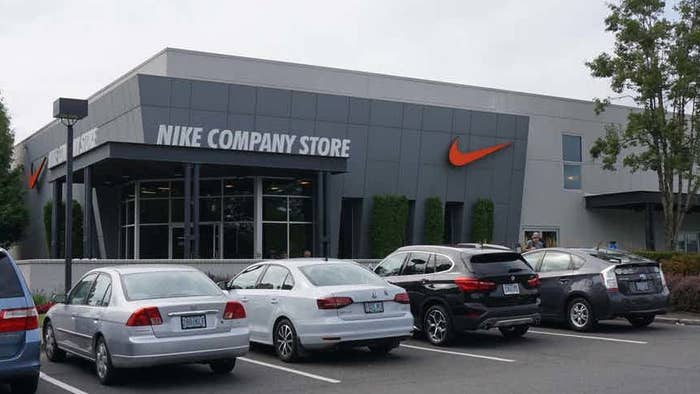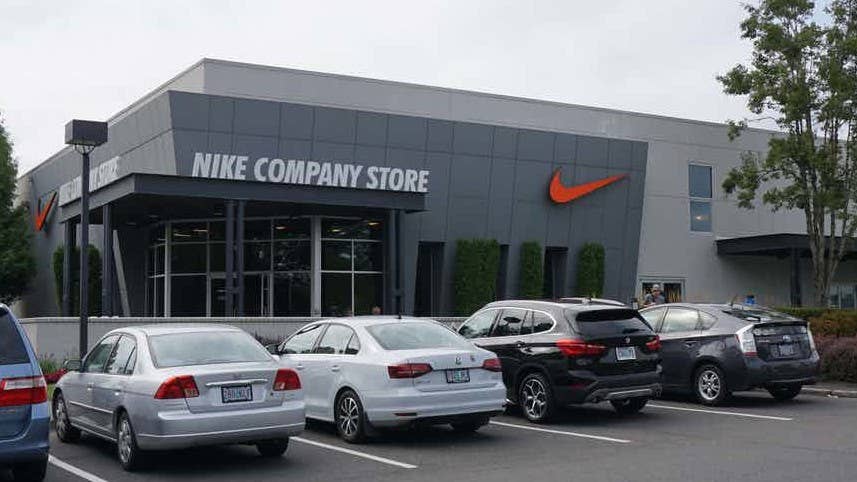
Scandal shook Nike last week as Ann Hebert, an employee of 25 years who most recently served as vice president of the brand’s North America business, resigned from her position following a Bloomberg Businessweek story uncovering her son’s sneaker resale operation. The bombshell piece focused on West Coast Streetwear, an Oregon-based business run by Hebert’s 19-year-old son, Joe, who was selling upward of $200,000 a month in sneakers at one point. Sources tell Complex that part of this operation involved buying up discounted Nike product from the brand’s company store (formerly known as the employee store, to which only Nike employees, their friends and family, and those with a guest pass have access) in the suburbs of Portland, Oregon.
“He just has people go in there, buy a bunch of stuff, come back out. Then they drive to his warehouse and drop it off,” says one reseller, who asked that their name be withheld.
The Bloomberg Businessweek story did not specify whether Joe’s business directly benefited from his mother’s high-ranking role at the world’s most powerful sneaker company. It established a connection between Joe’s business and his mother, whose name reportedly appeared on a West Coast Streetwear credit card statement shared with Bloomberg Businessweek, but Joe told the outlet that he didn’t receive any inside information about Nike from her. Out of due diligence, Ann disclosed her son’s involvement as a reseller to Nike in 2018, and her employer reportedly told Bloomberg Businessweek “there was no violation of company policy.”
Still, news of the connection prompted rampant speculation online that nepotism enabled the teenage reseller. Sneaker collectors, increasingly frustrated at their own inability to buy limited-edition items, were furious at the photos of Joe posing next to towering stacks of rare pairs. They believed Ann had granted her son access to Nike’s most exclusive product, cheating the system in favor of her family. The anger was precipitated this year by a similar fiasco around the Trophy Room x Air Jordan 1, a sneaker created by Michael Jordan’s son Marcus, who was credibly alleged to have resold his own shoes for massive profit.
Sneaker reselling is widespread but somewhat taboo, seen by many as an unnecessary middle-manning that makes it harder for real fans to get the shoes they want. Nike employees have even been indicted for profiting directly from reselling rare sample shoes. And yet here, in the case of Ann Hebert, was the appearance that one of its top execs was complicit in a sizable resale organization.
Her son did not respond to multiple requests for comment. I’ve spoken to him before, first for a story on StockX that Complex ran last summer in which he insisted that his last name was “West.” And, full disclosure, Joe also expressed interest in buying a portion of my sneaker collection to resell in a separate conversation, but we never did any business.
Resellers who know Joe tell Complex that his mother is not directly involved in sourcing shoes for him. They say that much of his inventory comes from botting, where a reseller employs a computer program to snatch up stock from an online sneaker store on release days. But, they say, he did buy and resell sneakers from the Nike company store.
According to former Nike employees, reselling items bought on discount at the store is a fireable offense. Shoppers have to check in upon entering and show identification as they check out. Sources tell Complex that Joe was careful not to buy sneakers for his business at the company store (formerly known as the employee store) in a way that could be traced back to his mother. Rather than get into the store using her name, he would recruit others with connections to Nike to make runs for him.
“He would have other employees and other people on the list go for him,” says Brandon Cannard, a reseller from Oregon who’s also bought shoes from the outlet by proxy.
Cannard says that Joe used to work for him and was against using his mom’s connections to further his sneaker business because of the possible repercussions for her. But Joe’s proximity to Nike did allow him a level of access most resellers don’t have.
“It was not hard for him to find other people in his class, and in his peer group, that worked for Nike,” says another reseller.
The resellers who spoke to Complex did not allege any wrongdoing on behalf of the employees at the Nike company store in Oregon. Nike did not provide Complex with details regarding its policies around sneaker reselling in a statement.
“Nike has clearly defined policies as part of its Code of Business Conduct,” the brand said. “There is no commercial affiliation between WCS LLC and Nike, including the buying or selling of Nike products.”
The brand’s company store offers most product at 50 percent off retail price for employees and 40 percent off for their families. That’s an enticing margin for resellers, a rate that allows them to essentially buy at wholesale prices like a regular retailer would. It’s long made the store a destination for people in Oregon looking to flip sneakers for a markup.
“If any reseller really wants the employee store, they can get the employee store,” says a 22-year-old Portland-based reseller who goes by @ballhardnocourt on Twitter.
He maintains that he doesn’t know Joe’s business well enough to say whether he used the store to get stock for West Coast Streetwear, but that doing so would be easy enough. Guest passes, he says, can often be purchased on social media platforms for $30, offering those outside of Nike friends and family entry into the exclusive store. These passes are given out as promotional items in the Portland area—the fitness studio Orange Theory might use them as incentives for members, or a health care company might reward its employees with them. Nike vendors like Foot Locker will sometimes give passes to their employees.
The details of how Nike product flows in Portland have been lost in some of the outrage around the Hebert scandal. Those who may not realize how disconnected a VP is from the ground-level distribution of shoes have a skewed view of the events, according to one longtime reseller in Oregon who asked to remain anonymous.
“People who aren’t from here who don’t know think that you can just press a button and a bunch of shoes appear,” they say.
Though some of the anger at the perceived unfairness of Hebert helping her son’s reselling business, in whatever way she did, may be misguided, it’s absolutely understandable. It’s a symptom of a system that people have come to regard as unfair because it feels that way every time they unsuccessfully try to buy a pair of shoes on Nike’s SNKRS app. It’s a convenient representation of all the things people have come to hate about sneaker hype.
Aggression has poured into the comments section of Joe Hebert’s every social media account. He is being lambasted by commenters for profiting off the strength of his mother’s credit card, with one going so far as to label him a “destroyer of families.” The scandal has prompted endless jokes about his mother resigning. Though the moment has captured the public’s attention, the anonymous reseller in Oregon says that they’ve seen people with ties to Nike take advantage of the company store discount plenty of times.
The difference, they say, is that those with connections so high up usually don’t get caught.
“Privileged kids, they get away with stuff.”


